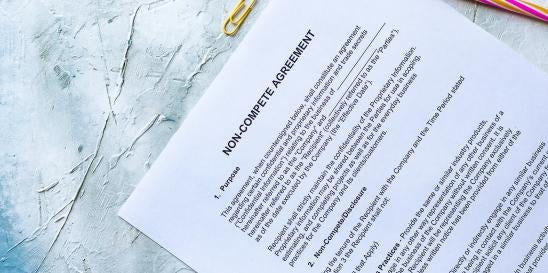There was a lot of consternation among U.S. employers earlier this year when the Federal Trade Commission (FTC) announced potential rulemaking that would render non-compete agreements illegal in most instances. While that process remains underway, this week the top lawyer at the National Labor Relations Board (NLRB) also has weighed in on non-competes and has declared that many restrictive covenants in employment agreements violate labor law.
According to the NLRB’s press release: “Today, NLRB General Counsel Jennifer Abruzzo sent a memo to all Regional Directors, Officers-in-Charge, and Resident Officers, setting forth her view that the proffer, maintenance, and enforcement non-compete provisions in employment contracts and severance agreements violate the National Labor Relations Act except in limited circumstances. The memo explains that overbroad non-compete agreements are unlawful because they chill employees from exercising their rights under Section 7 of the National Labor Relations Act, which protects employees’ rights to take collective action to improve their working conditions. Specifically, these agreements interfere with employees ability to: 1. concertedly threaten to resign to secure better working conditions; 2. carry out concerted threats to resign or otherwise concertedly resign to secure improved working conditions; 3. concertedly seek or accept employment with a local competitor to obtain better working conditions; 4. solicit their co-workers to go work for a local competitor as part of a broader course of protected concerted activity; 5. seek employment, at least in part, to specifically engage in protected activity, including union organizing, with other workers at an employer’s workplace.”
The press release goes on to note that in some limited circumstances, non-compete clauses may be lawful: “General Counsel Abruzzo explains that in some cases, noncompete agreements could be lawful if the provisions clearly restrict only individuals’ managerial or ownership interests in a competing business, or true independent-contractor relationships. Moreover, there may be circumstances in which a narrowly tailored non-compete agreement’s infringement on employee rights may be justified by special circumstances.”
The memo also notes that the NLRB will be coordinating enforcement with regard to a potential crackdown on non-competes with the other agencies, including the FTC and the Department of Justice.
This development may be somewhat surprising given that the National Labor Relations Act was passed nearly 100 years ago and has not been cited previously as a basis to invalidate standard restrictive covenants found in countless employment agreements around the country. This is, however, in line with the aggressive agenda set forth by Abruzzo and employers should be prepared for more landscape-changing labor law decisions from the agency in the coming months.
Bottom line: Non-compete agreements are under siege on multiple fronts at the federal level. This is an area all employers should watch.



 i
i


